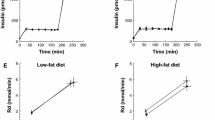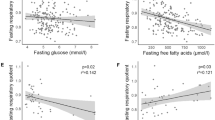Abstract
Acute increases in plasma levels of long-chain fatty acids raise plasma insulin levels by stimulating insulin secretion or by decreasing insulin clearance. In normal subjects, longterm elevations of fatty acids also stimulate insulin secretion. In fact, they increase insulin precisely to the degree needed to compensate for the fatty acid-induced insulin resistance. In contrast, in individuals who are genetically predisposed to develop type 2 diabetes (prediabetic subjects), the free fatty acid (FFA) stimulation of insulin secretion is not sufficient to fully compensate for the FFAinduced insulin resistance. Therefore, obesity, if associated with elevated fatty acid levels, may lead to hyperglycemia in prediabetic but not in normal individuals.
Similar content being viewed by others
References and Recommended Reading
Felber JP, Vanotti A: Effects of fat infusions on glucose tolerance and insulin plasma levels. Med Exp 1964, 10:153–156.
Pelkonen R, Miettinen A, Taskinen MR, Nikkila EA:Effect of acute elevation on plasma glycerol,triglyceride and FFA levels on glucose utilization and plasma insulin. Diabetes 1968, 17:76–82.
Crespin SR, Greenough WB, Steinberg D: Stimulation of insulin secretion by long-chain free fatty acids. J Clin Invest 1973, 52:1979–1984.
Hennes MMI, Dua A, Kissebah AH: Effects of free fatty acids and glucose on splanchnic insulin dynamics. Diabetes 1997, 46:57–62.
Balent B, Goswami G, Goodloe G, et al.: Acute elevation of NEFA causes hyperinsulinemia without effect on insulin secretion rate in healthy human subjects. Ann N Y Acad Sci 2002, 967:535–543.
Peiris AN, Mueller RA, Smith GA, et al.: Splanchnic insulin metabolism in obesity. Influence of body fat distribution. J Clin Invest 1986, 78:1648–1657.
Zhou YP, Grill VE: Long-term exposure of rat pancreatic islets to fatty acids inhibits glucose-induced insulin secretion and biosynthesis through a glucose fatty acid cycle. J Clin Invest 1994, 93:870–876.
Sako Y, Grill VE: A 48-hour lipid infusion in the rat timedependently inhibits glucose-induced insulin secretion and beta-cell oxidation through a process likely coupled to fatty acid oxidation. Endocrinology 1990, 127:1580–1589.
Boden G: Obesity, free fatty acids, and insulin resistance. Curr Opin Endocrinol Diab 2001, 8:235–239. Examines the effects of FFA on insulin action and secretion.
Benjamin SM, Valdez R, Geiss LS, et al.: Estimated number of adults with prediabetes in the US in 2000: opportunities for prevention. Diabetes Care 2003, 26:645–649. Recent review of prevalence and incidence of prediabetes, glucose intolerance, and diabetes in the United States.
Boden G, Chen X, Rosner J, et al.: Effects of a 48-h fat infusion on insulin secretion and glucose utilization. Diabetes 1995, 44:1239–1242.
Jensen CB, Storgaard H, Holst JJ, et al.: Insulin secretion and cellular glucose metabolism after prolonged low-grade intralipid infusion in young men. J Clin Endocrinol Metab 2003, 88:2775–2783.
Kashyap S, Belfort R, Gastaldelli A, et al.: A sustained increase in plasma free fatty acids impairs insulin secretion in nondiabetic subjects genetically predisposed to develop type 2 diabetes. Diabetes 2003, 52:2461–2474. Demonstration that long-term elevation of plasma FFA impairs glucose-stimulated insulin secretion in prediabetic individuals.
Carpentier A, Mittelman SD, Lamarche B, et al.: Acute enhancement of insulin secretion by FFA in humans is lost with prolonged FFA elevation. Am J Physiol 1999, 276:E1055-E1066.
Storgaard H, Jensen CB, Vaag AA, et al.: Insulin secretion after short- and long-term low-grade free fatty acid infusion in men with increased risk of developing type 2 diabetes. Metabolism 2003, 52:885–894.
Boden G, Chen X: Effects of fatty acids and ketone bodies on basal insulin secretion in type 2 diabetes. Diabetes 1999, 48:577–583.
Boden G, Chen X, Iqbal N: Acute lowering of plasma fatty acids lowers basal insulin secretion in diabetic and nondiabetic subjects. Diabetes 1998, 47:1609–1612.
Santomauro A, Boden G, Silva M, et al.: Overnight lowering of free fatty acids with acipimox improves insulin resistance and glucose tolerance in obese diabetic and non-diabetic subjects. Diabetes 1999, 48:1836–1841.
Dobbins RL, Chester MW, Daniels MB, et al.: Circulating fatty acids are essential for efficient glucose-stimulated insulin secretion after prolonged fasting in humans. Diabetes 1998, 47:1613–1618.
Stefan N, Stumvoll M, Bogardus C, Tataranni PA: Elevated plasma nonesterified fatty acids are associated with deterioration of acute insulin response in IGT but not NGT. Am J Physiol 2003, 284:E1156-E1161.
Boden G, Soeldner JS, Gleason RE, Marble A: Elevated serum human growth hormone and decreased serum insulin in prediabetic males after intravenous tolbutamide and glucose. J Clin Invest 1968, 47:729–739.
Pimenta W, Korytkowski M, Mitrakou A, et al.: Pancreatic beta-cell dysfunction as the primary genetic lesion in NIDDM: evidence from studies in normal glucose-tolerant individuals with a first-degree NDDM relative. JAMA 1995, 273:1855–1861.
Hirose H, Lee YH, Inman LR, et al.: Defective fatty acid mediated beta-cell compensation in Zucker diabetic fatty rats. J Biol Chem 1996, 271:5633–5637.
Unger RH: Lipotoxicity in the pathogenesis of obesity-dependent NIDDM. Genetic and clinical implications. Diabetes 1995, 44:863–870.
Author information
Authors and Affiliations
Rights and permissions
About this article
Cite this article
Boden, G. Free fatty acids and insulin secretion in humans. Curr Diab Rep 5, 167–170 (2005). https://doi.org/10.1007/s11892-005-0004-5
Issue Date:
DOI: https://doi.org/10.1007/s11892-005-0004-5




